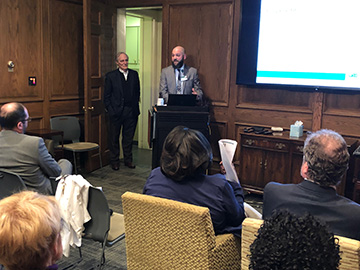 The February Forum drew a standing room only crowd as well as more than a dozen virtual attendees. CCTS Director Dr. Robert Kimberly (standing L) introduced the new UAB IRB Director, Adam McClintock (standing behind lectern).
The February Forum drew a standing room only crowd as well as more than a dozen virtual attendees. CCTS Director Dr. Robert Kimberly (standing L) introduced the new UAB IRB Director, Adam McClintock (standing behind lectern).
On Monday, February 11, 2019, CCTS Director Dr. Robert Kimberly discussed the numerous improvements in clinical trial expertise, capacity, and processes underway at the Hub and encouraged investigators to fully embrace the opportunities inherent in more effective approaches for clinical trial feasibility, budgeting, contracting, recruitment, and time to activation. He addressed the CCTS Clinical Trials Initiative (CTI) within the context of national trends and expectations for increased rigor, safety, and efficiency.
“The CCTS CTI seeks three overarching goals,” he said, “to bring innovative therapies to the patients we serve, to insure excellence in the conduct and management of clinical trials, and to grow our portfolio of industry and investigator-initiated studies and federally and industry funded local and multi-site trials.”
A Changing Clinical Trial Landscape
Kimberly reviewed several improvements that have “laid the foundation for a leap forward in clinical trial effectiveness” at UAB and beyond, including
- the implementation of the OnCore Enterprise clinical trials management system at UAB;
- the integration of OnCore protocol and patient data with UAB’s electronic health record (Cerner’s IMPACT) via PowerTrials;
- the Southeast Health Alliance for Research (SHARE), a consortium launched by CCTS to identify sites and explore feasibility for multisite studies in the Deep South;
- NCATS’ Trial Innovation Network, which seeks to improve time to activation and patient recruitment methods;
- NCATS’ Streamlined, Multisite, Accelerated Reliance for Trials (SMART) IRB reliance agreements, which speed implementation of multisite studies;
- informatics-enabled platforms that support strategic site identification and study feasibility, including TriNetX, which brings industry sponsored trial opportunities to the CCTS Network, and the Accrual to Trials (ACT) Network, which provides the ability to explore the patient populations and find collaborators at more than 35 CTSA Hubs across the country; and
- UAB’s i2b2 instance, which provides access to clinical data on more than 1 million patients, supporting self-service querying for hypothesis generation, cohort identification, and research (e.g., correlational studies, retrospective analyses). With IRB approval, i2b2 can be used for prospective analyses and recruitment.
“We have the opportunity to work together to leverage these and other changes in a way that will transform our clinical trials, increasing the pace of scientific discovery and catalyzing improvements in the health of our patients and regional populations,” Kimberly said.
Ongoing Clinical Trial Challenges
Shifting gears, Kimberly addressed several implementation processes that continue to undercut clinical trial success (budgeting, contract negotiation, recruitment, and a less than competitive time-to-activation). He shared the results of an analysis comparing the start-up fees charged by other institutions, such as Yale and Duke, which range from $10,000-$25,000. A lively discussion ensued.
Attendees also heard from UAB’s new IRB Director Adam McClintock, who recently arrived on campus from The Ohio State University. Prior to joining the UAB Office of the Vice President for Research in January 2019, McClintock served as the Operations Manager for the Office of Responsible Research Practices. He looks forward to working with “the talented and dedicated individuals who make up the Office of the IRB.”
In case you missed it, you can watch a video recording of the presentation on our CCTS YouTube channel. A pdf of Dr. Kimberly’s slide deck and several handouts, including the November 2018 recommendations of the Clinical Trials Transformation Initiative, are available on the CCTS Monthly Forum page.